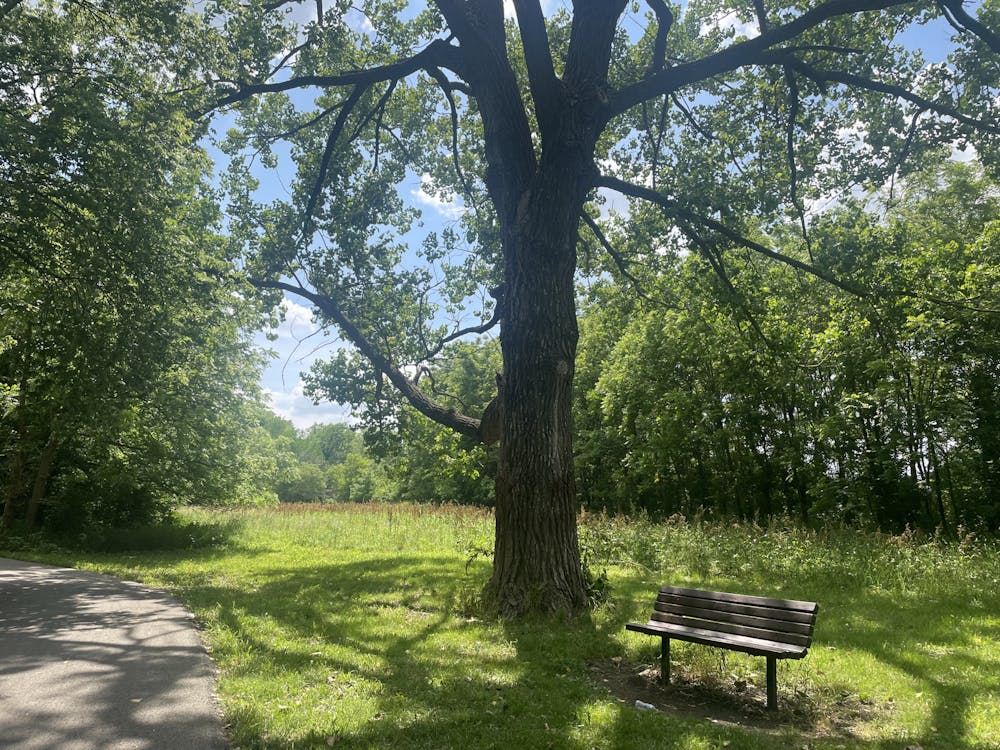
I did not learn to love the land that raised me until I had already left.
In every introduction during my first week of college, that land haunted me. Like a scar, it was irrefutable proof of where I had been, and it clung to every artifact of my life: my area code, my driver’s license and (most regrettably) my introduction. “Let’s go in a circle and say our name and where we’re from.” With a California to my left and a New York to my right, I have to pipe up, “Hi, my name is Riley, and I’m from Kansas.”
My mom advised me to say Kansas City, not Kansas, hinting at the shame it is to come from the quintessential middle-of-nowhere state. But I didn’t see a point in stretching the truth, claiming to be from some city I’m a half-hour drive from. So, in group introductions, I stand my ground: I’m from Kansas.
The group introduction is more merciful than the alternative. One-on-one, your comrade in conversation now has a decision to make: What is there to say about Kansas? There’s no “I bet you go to the beach all the time” like California, no “Winter must be great there” like New York.
“Flat, huh,” they remark. “Have you ever seen a tornado?” I haven’t. “Is your favorite movie The Wizard of Oz?” It isn’t.
As a child, I waited for my sentence in Kansas to end. I imagined I was a prisoner of war, being detained in some sunflower-strewn foreign land and wishing only for the soil beneath me to be that of my real home, someplace far away with more to do. But during my senior year, as I stretched outward to the East Coast to visit one college after another — one non-direct flight after another — something curious happened. No bustling city I visited felt more like home than suburban Kansas.
I soothed myself through the affirmation that not every city is the same. New York City isn’t for everyone, I reasoned. I would be happier in a city with more character, like Providence. Then I visited, and…well, Providence might be an acquired taste, I concluded. But who doesn’t like Boston? So I took the train, and…well, there was a loud jackhammer when I exited the subway, and so much construction, so I probably didn’t meet Boston on the best day, but...
Every city I visited, I left there with a new one in mind, another sojourn on the horizon where surely I’ll feel like I belonged there this whole time, and every other direction I strayed was just me taking the scenic route.
In New York City, rushing to board a departing train, my mother’s earring snagged on my brother’s shirt. A stranger on the train scoffed and stepped far away from us, signaling that this scene oh-so inconvenienced him in his flat-bill baseball cap, his chunky hipster glasses, his ripped skinny jeans and his yipping chihuahua, held close to his chest by a baby wrap. In Providence, you were lucky to walk on the sidewalk and have cigarette smoke blown in your face rather than pot. In Boston, people took friendly eye contact and a smiling head nod as an insult. In Baltimore, people strut down the middle of a walkway hollering “Move!” and then act offended when you collide.
Too little, too late, I realized one truth that appeared before me larger than any truth before: I was no prisoner of war in Kansas, and no city would feel more like home than the pastoral Midwest. But like Orpheus turning back to behold his wife Eurydice and share with her his joy, I turned to look at Kansas, and she was gone.
I did not learn to love the land that raised me until it was too late. Writing this sitting in my dorm bed, I imagine myself a prisoner of war, waiting to return to the land so flat you can see a full three miles out from where you stand — granted, there isn’t a hay bale or combine in the way.
Until I return to Kansas, though, I can redefine my attitude toward the city as a construct, acknowledging what it can offer me during my stay here that Kansas cannot. In Kansas, the best peer-to-peer political debate you could find was on Thanksgiving as your relatives parroted far-right conspiracy theories that border on clinical insanity. The most affordable and convenient weeknight “cultural enrichment” was a high school musical in which the lead is off-pitch and has a memory slip in the first act. The best thing to do as a group was to drive to Target, explore the dollar section and toy aisle as a hands-on museum and drive behind the AMC Theatres to sit in the car and talk for hours afterward.
For the next four years, I’ll find a way to be happy in both worlds: eagerly anticipate the return to one rather than dread the stay in the other. So now, I relish the opportunity to replace family arguments with academic political panels, two-star high school musicals with concerts from names you actually recognize and Target with Mom-and-Pop shops. But still, I long for the return to seven-mile walks after midnight down empty streets where you can go hours without seeing the headlights of a car; for buying tickets to a movie and having the theater alone; and for driving miles on backroads without needing a turn signal, the landscape rolling on beside you like one long roll of film.
Riley Strait is a freshman from Olathe, KS majoring in Writing Seminars and English.





